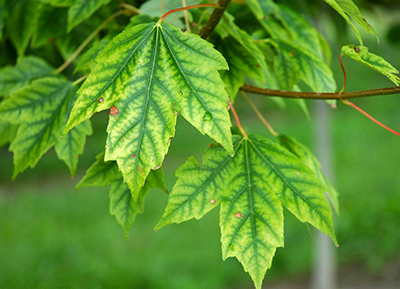Knowing soil nutrient status is first step in developing fertilizer program
Soil and foliar nutrient tests will help identify which plant nutrients are adequate and which may need to be added to improve the growth and quality of nursery stock and Christmas trees.

Often some fertilization is needed to produce high-quality field grown ornamentals and Christmas trees. Usually, growers want to improve characteristics such as growth or color. While soils in Michigan are sufficient to support plant growth, research and experience have shown there is potential to improve the quality of many tree species through fertilization. The first place to start with any nutrient management program is with a soil test.
Ornamentals and Christmas trees require 18 nutrients for healthy growth and productivity. The soil is a reservoir of these nutrients. Trees utilize these nutrients and they need to be replenished from time to time. By having your soil tested, you can learn which nutrients are present and which ones need to be added.
In addition to fertilizer recommendations, soil test results also include the pH, a measure of the acidity of the soil. If the pH is outside the desirable range, certain key nutrients such as iron and manganese will not be available to plants, even though the elements may be present in adequate quantities. Most conifer species prefer slightly acid soil with a pH in the range of 5.5 to 6.5. However, the optimum pH will vary by species. For example, Fraser fir does not grow well when the pH is much above 6.0, whereas spruce can tolerate pH up to 7.0. Yellowing of leaves or interveinal necrosis can occur on oaks and maples if the pH is higher than 6.5 due to low iron or manganese availability.
Soil and foliar tests will identify which nutrients are deficient. This is an essential step to providing adequate nutrients to meet your plants needs and avoid over-application of fertilizers which can waste money, reduce plant quality and pollute streams, lakes and groundwater.

Interveinal necrosis on leaves.
A new webinar series on soil and plant nutrition for field grown nursery stock and Christmas trees is being offered by Michigan State University Extension Feb. 3, 10, 17 and 24, 2016, from 12:30-1:30 p.m. Growers will be able to earn pesticide recertification credits (Michigan only) and Certified Green Professional CEUs (Michigan Nursery and Landscape Association). Credits for ISA Certified Arborists are still pending. This series will help enable you to more effectively select sites, match species and evaluate soil nutrient modification to improve tree and shrub performance.



 Print
Print Email
Email




